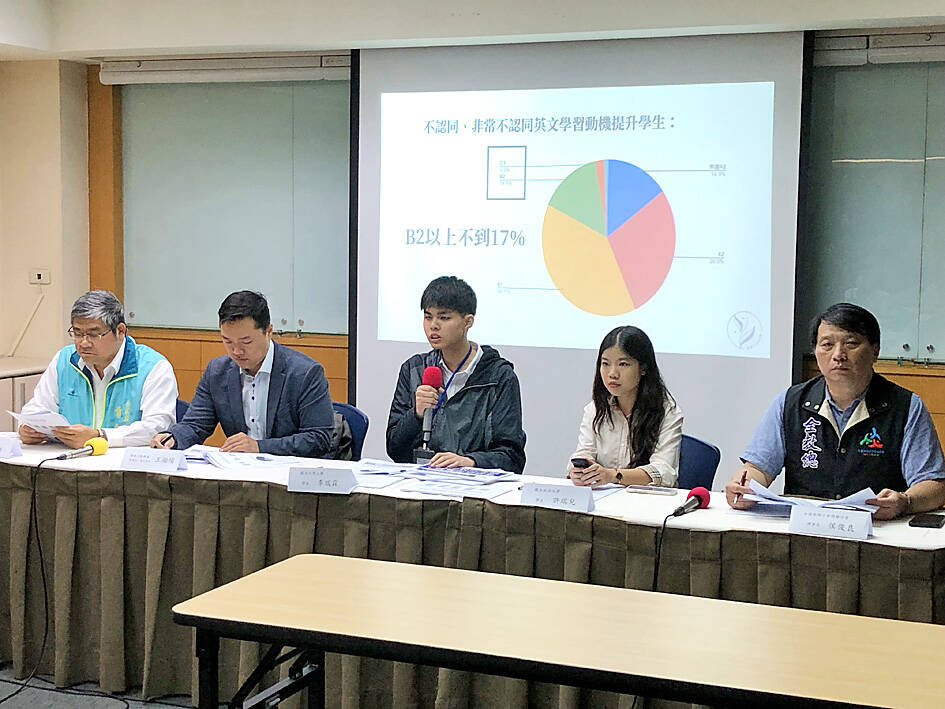The government should include student opinions in its Bilingual 2030 initiative to promote English-language education, student group EdYouth said yesterday.
The Taiwanese education system is still beholden to examinations, with English education reduced to rote memorization and multiple-choice questions, said EdYouth cofounder Lee Ruei-lin (李瑞霖), a political science student at National Taiwan University.
Announcing the results of the group’s survey, Lee told a news conference in Taipei that 57.5 percent of students do not find their English courses enjoyable or helpful.

Photo: Rachel Lin, Taipei Times
Of the 1,025 junior and senior-high students surveyed, 42.5 percent said they were enjoyable or helpful, he said.
As for using English in other subjects, 30.4 percent said that teaching courses such as mathematics and geography in English would help their language ability, while 34.8 percent strongly disagreed.
Respondents were asked to rank their agreement on a scale of one to five, with one indicating strong disagreement, and two disagreement.
About 22.7 percent said that using English to teach other subjects would increase their interest in the subjects, while 36.7 percent disagreed.
About 36.5 percent said they believed that their studies of other subjects would be affected by the use of English, as opposed to the 19.9 percent who said it would not.
About 38.3 percent said that studying other subjects in English would increase their motivation to learn the language, while 24.5 percent said they strongly disagreed.
EdYouth said it was concerned that the Bilingual 2030 policy might widen the education gap, as only 17 percent of those who disagreed with the motivation question had achieved a B2 level of English or higher.
A first-year high-school student from Taichung told the news conference that they had no time to study English conversation or topics of interest to them, as they had to study for tests.
Of the respondents, 45.5 percent agreed that English ability is an indicator of competitiveness, but 41.8 percent said they worried that it would crowd out their mother tongues.
National Chengchi University law student Hsu Ruei-er (許瑞兒) said that although she had studied Hoklo (commonly known as Taiwanese) for a decade, she still does not know it well.
Considering how the Taiwanese education system is oriented toward assessment and achievement, it would be difficult to adopt a bilingual curriculum, she said.
Most teachers are not prepared to teach in English, Action Alliance on Basic Education chairman Wang Han-yang (王瀚陽) said.
Forcing students without the language ability to take courses in English would severely affect their performance in other subjects, Wang said.
Schools in rural areas also do not have access to the same resources as those in cities such as Taipei, he said, adding that he was concerned students in those areas would fall further behind.
As teachers are sought for their English ability over professional aptitude, the policy would change the makeup of the nation’s teaching staff over time, National Federation of Teachers’ Unions chairman Hou Chun-liang (侯俊良) said, calling for English to be removed from the teachers’ exam for non-English instructors.

Taiwan has received more than US$70 million in royalties as of the end of last year from developing the F-16V jet as countries worldwide purchase or upgrade to this popular model, government and military officials said on Saturday. Taiwan funded the development of the F-16V jet and ended up the sole investor as other countries withdrew from the program. Now the F-16V is increasingly popular and countries must pay Taiwan a percentage in royalties when they purchase new F-16V aircraft or upgrade older F-16 models. The next five years are expected to be the peak for these royalties, with Taiwan potentially earning

STAY IN YOUR LANE: As the US and Israel attack Iran, the ministry has warned China not to overstep by including Taiwanese citizens in its evacuation orders The Ministry of Foreign Affairs (MOFA) yesterday rebuked a statement by China’s embassy in Israel that it would evacuate Taiwanese holders of Chinese travel documents from Israel amid the latter’s escalating conflict with Iran. Tensions have risen across the Middle East in the wake of US and Israeli airstrikes on Iran beginning Saturday. China subsequently issued an evacuation notice for its citizens. In a news release, the Chinese embassy in Israel said holders of “Taiwan compatriot permits (台胞證)” issued to Taiwanese nationals by Chinese authorities for travel to China — could register for evacuation to Egypt. In Taipei, the ministry yesterday said Taiwan

Taiwan is awaiting official notification from the US regarding the status of the Agreement on Reciprocal Trade (ART) after the US Supreme Court ruled US President Donald Trump's global tariffs unconstitutional. Speaking to reporters before a legislative hearing today, Premier Cho Jung-tai (卓榮泰) said that Taiwan's negotiation team remains focused on ensuring that the bilateral trade deal remains intact despite the legal challenge to Trump's tariff policy. "The US has pledged to notify its trade partners once the subsequent administrative and legal processes are finalized, and that certainly includes Taiwan," Cho said when asked about opposition parties’ doubts that the ART was

If China chose to invade Taiwan tomorrow, it would only have to sever three undersea fiber-optic cable clusters to cause a data blackout, Jason Hsu (許毓仁), a senior fellow at the Hudson Institute and former Chinese Nationalist Party (KMT) legislator, told a US security panel yesterday. In a Taiwan contingency, cable disruption would be one of the earliest preinvasion actions and the signal that escalation had begun, he said, adding that Taiwan’s current cable repair capabilities are insufficient. The US-China Economic and Security Review Commission (USCC) yesterday held a hearing on US-China Competition Under the Sea, with Hsu speaking on